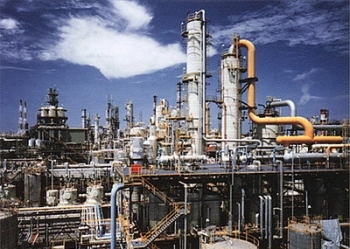Ghana is yet to reap the benefits of an oil industry because authorities were hasty in planning the structure of the multi-billion dollar industry, Vice Chairman of the Public Interest and Accountability Committee has said.
Speaking on Joy FM’s Super Morning Show Tuesday, Kwame Jantuah believes that commercial production of oil within three years of its discovery in 2007 was a “very very short time”.
“We started quite early three years. This is a very short time. We have done that and some would say ‘kudos’ to Ghana but yes it has brought us certain challenges”
With Ghana having to rely on a 1984 PNDC law, oil companies motivated by profit were not going to wait for Ghanaian laws before commercial production, he explained.
According to him, our “need for money” informed the haste and robbed Ghana to opportunity to design appropriate legislations that will ensure the benefit of ordinary Ghanaians.
But lacking the huge financial investment needed, Ghana needed to give incentives for oil companies to come in, resulting in the signing of contracts with foreign companies.
Ghana makes 5% in royalties from the Jubilee Oil fields as at the signing of the contract by 2006. TEN will also give Ghana 5% royalties. Contrasting this position, he said, governments in the Middle East have a much higher share in the commercial production of oil because they had the power to make huge initial investments.
He believes that it should have taken 10 years after discovery to plan better and maximize benefits such as training Ghanaians and local companies in the highly technical industry and prepare for the oil boom. Citing an example of poor planning, he said Ghana is yet to pass laws to deal with an important issue – oil spillage.
He continued that volatility in the oil industry has exposed a lack of planning. “This volatility has put us in a very challenging position.” Five years after commercial production, Kwame Jantuah argues that “we do not as yet have an oil industry, we have oil fields”, he dismissed the impression.
He defined an oil industry as one in which all licensed oil production companies are producing and selling the exhaustible resource. At the moment, he believes Ghana has shown signs of the “beginnings” of an industry, the oil revenue monitoring body noted.
Nonetheless, it is not too late because more oil discoveries are being made. He said about seven more have been made. “We should make sure that we don’t raise hopes high. We should make sure we plan it properly”.
One of the ways he proposes is to leave the task of planning to the National Development Planning Commission (NDPC). He believes a concrete plan followed by every government should see Ghana prosperous in about 15 years.
The second largest of Ghana’s Oil fields is the Tweneboa, Enyenra and Ntomme (TEN) expected to begin commercial production in 2016. TEN fields are located in the Deepwater Tano basin which covers an area of more than 800 sq km, and lies around 20km west of British firm Tullow’s Jubilee field.
FRENCH VERSION
S’exprimant sur l’émission du matin de Joy FM Super mardi,Kwame Jantuah croit que la production commerciale de pétroledans trois ans après sa découverte en 2007 était « très très peude temps ».
“Nous avons commencé très tôt trois ans. Il s’agit d’un temps trèscourt. Nous l’avons fait et certains diraient ‘Félicitations’ auGhana mais oui il nous a apporté certains défis”
Avec le Ghana devoir s’appuyer sur une loi de 1984 PNDC,compagnies pétrolières motivés par le profit n’allaient pasattendre des lois ghanéennes avant production commerciale, a-t-il expliqué.
Selon lui, notre « besoin d’argent » a informé la hâte et volé leGhana à l’occasion de concevoir des législations appropriées quiassureront la prestation des Ghanéens ordinaires.
Mais n’ayant pas l’énorme investissement financier nécessaire,Ghana nécessaires pour offrir des incitations pour lescompagnies pétrolières à venir, aboutissant à la signature decontrats avec des sociétés étrangères.
Ghana rend 5 % des redevances depuis les gisements de pétrolede Jubilé comme lors de la signature du contrat en 2006. DIXdonnera également des redevances de 5 % de Ghana.Contrastées de cette position, dit-il, les gouvernements duMoyen-Orient ont une part beaucoup plus élevée pour laproduction commerciale de pétrole parce qu’ils avaient lepouvoir de faire d’énormes investissements initiaux.
Il croit qu’il aurait dû prendre 10 ans après la découverte à mieuxplanifier et optimiser les avantages comme les Ghanéens de laformation et les entreprises locales dans le secteur hautementtechnique et se préparer pour la boom pétrolier. Citant unexemple de mauvaise planification, il a dit qu’encore le Ghana estd’adopter des lois pour faire face à une question importante –déversement de pétrole.
Il a poursuivi que la volatilité dans le secteur pétrolier a exposéun manque de planification. « Cette volatilité nous a mis dansune position très difficile. » Cinq ans après la productioncommerciale, Kwame Jantuah affirme que « nous n’avons pasencore une industrie pétrolière, nous avons des champspétrolifères », il a rejeté l’impression.
Il a défini une industrie pétrolière comme celle dans laquelletoutes les sociétés de production de pétrole sous licence sontproduisant et vendant les ressources épuisables. Pour l’instant, ilcroit que Ghana a montré des signes du « début » d’uneindustrie, les revenus pétroliers surveillance corps noté.
Néanmoins, il n’est pas trop tard car plusieurs découvertes depétrole sont faits. Environ sept autres ont été faites, dit-il. “Nousdevons nous assurer que nous ne soulèvent pas espoirs élevés.Nous devrions veiller à ce que nous prévoyons il correctement”.
Un des moyens qu’il propose est de laisser la tâche deplanification à la National Development Planning Commission(Commission). Il croit un plan concret, suivi par tous lesgouvernements devrait voir Ghana prospère dans une quinzained’années.
Au second rang des champs de pétrole du Ghana est leTweneboa, Enyenra et Ntomme (dix) devrait commencer àproduire en 2016. DIX champs sont situés dans le bassin d’eau profonde Tano qui couvre une superficie de plus de 800kilomètres carrés et se trouve à environ 20km à l’ouest du champde Jubilee de Britannique Tullow ferme.


